Author Archive
Monday, October 31st, 2011
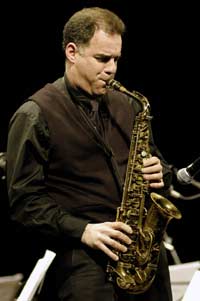
The North Carolina Central University Jazz Studies program will present the 12th Annual Fall Guest Artist Series, featuring saxophonist Jim Snidero, on Friday, Nov. 18, at 8 p.m. in the B.N. Duke Auditorium. The NCCU Jazz Ensemble, Vocal Jazz Ensemble and Jazz Combo I will also perform, presenting a CD-release concert featuring music from “Slightly Blued.” Snidero will also offer a master class and lecture in the Jazz Band Room at noon the same day.
After studying at the University of North Texas, Snidero gained recognition as a member of Brother Jack McDuff’s group, traveling throughout the United States and making three recordings. He has performed and recorded with Toshiko Akiyoshi, the Mingus Big Band, Eddie Palmieri, Frank Sinatra, Sting, Brian Lynch, Conrad Herwig, Walt Weisskopf and Frank Wess.
In 1984, Snidero released his first recording as a bandleader, titled “On Time.” Since then he has completed 14 recordings, including the chart topping “Tippin” in 2007. As a touring bandleader and recording artist, his list of sidemen reads like a who’s who in jazz, including names such as Tom Harrell, Billy Hart, Mulgrew Miller, Kenny Kirkland, Benny Green and Louis Hayes.
Snidero is also a leader in jazz education as an author and teacher. He is an adjunct faculty member at the New School for Jazz and Contemporary Music and at New Jersey City University. He is the author of The Jazz Conception Series, a widely used group of textbooks for jazz education. He is a clinician for Conn-Selmer, the leading manufacturer and distributor of band and orchestral instruments for professional, amateur and student use, and for Rico Reed, the largest manufacturer and distributor of reeds for wind instruments.
Sharing the state with Snidero will be the NCCU Jazz Ensemble, which will perform selections from its latest album, “Slightly Blued,” recorded in 2010. Last year the ensemble took home six first-place finishes at the Villanova Jazz Festival Collegiate Competition — best saxophone section, best rhythm section, best trumpet section, best soloist, first place combo and first place big band. As a result, the Jazz Ensemble opened the evening concert for the American Jazz Repertory Orchestra, directed by Clem Dirosa. “The album is a cutting-edge arrangement with a sense of adventurousness and a touch of tradition,” said Lenora Zenzalai Helm, visiting instructor and co-director of the Vocal Jazz Ensemble.
Tickets are $15 for general admission and $5 for students with ID. For more information, contact Dr. Ira Wiggins, director of the Jazz Studies program, at 919-530-7214 or the NCCU Department of Music at 919-530-6319.
Posted in Music News | 7 Comments »
Saturday, October 22nd, 2011
Beginning Oct. 24, WNCU will have a new host for jazz weekday evenings. Serena Wiley will be hosting the evening show weekdays, from 7-10pm. Serena is a graduate of NCCU’s jazz studies program. She plays tenor, alto sax, and flutes and is currently gigging in a reggae band. We welcome her expertise and passion for jazz to WNCU.
Posted in Music News | 13 Comments »
Saturday, October 22nd, 2011
On Sunday, Nov. 6, WNCU will change their schedule. Close to Thee, a new gospel program, hosted by Carolyn Satterfield, will air from noon until 2 pm. Join Carolyn for traditional gospel from some of the most beloved artists of all time.
Posted in Music News | 6 Comments »
Friday, October 7th, 2011
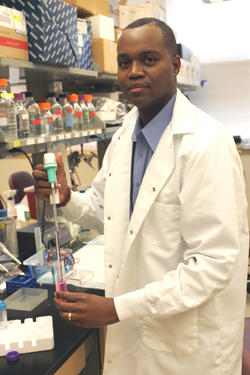 North Carolina Central University received final approval today from the University of North Carolina Board of Governors to introduce a doctor of philosophy (Ph.D.) program in integrated biosciences. The university will now begin recruiting students to enter the program in fall 2012, and would award its degrees four years later. They would be the first Ph.D.s awarded by the university in more than 50 years. North Carolina Central University received final approval today from the University of North Carolina Board of Governors to introduce a doctor of philosophy (Ph.D.) program in integrated biosciences. The university will now begin recruiting students to enter the program in fall 2012, and would award its degrees four years later. They would be the first Ph.D.s awarded by the university in more than 50 years.
The interdisciplinary doctorate will be offered on two tracks, biomedical sciences and pharmaceutical sciences. The program will be housed in the College of Science and Technology, but will draw also on the resources of NCCU’s Julius L. Chambers Biomedical/Biotechnology Research Institute (JLC–BBRI), the Biomanufacturing Research Institute and Technology Enterprise (BRITE) and the School of Library and Information Sciences. The curriculum will include offerings from the life sciences, physical sciences, computation and information sciences, pharmaceutical sciences and mathematics.
“Our Ph.D. in integrated biosciences is consistent with the UNC Tomorrow initiative, our own mission, and our strengths in health disparities research and biotechnology,” said NCCU Chancellor Charlie Nelms. “All 32 faculty engaged in the program have earned terminal degrees from some of the best research universities in the nation, and we have constructed nearly 150,000 square feet of state-of-the-art science space in the last 12 years.”
Research involving health disparities — the gaps between the health status of the nation’s racial and ethnic minorities compared with the population as a whole — has been explicitly part of the mission of BBRI since it opened in 1999, and a key focus of other NCCU science and public health programs for decades.
Shepherding the program to fruition was the NCCU dean of graduate studies, Dr. Chanta Haywood. “There is a diverse population of extremely bright students who want to be leaders in health disparities research,” Haywood said. “As graduate dean, I’m confident that we’ll attract them to our program.”
NCCU expects the program to reach an enrollment of about 20 full-time students in its fourth year of operation, and to graduate about five per year. An additional aim of the program is to expand the number of minority scientists, particularly African-Americans, in biomedical research. A recent report by the National Science Foundation noted that African-Americans make up about 12 percent of the U.S. population, but account for only 3 percent of the work force of scientists and engineers.
NCCU had a doctoral program in the mid-20th century that was short-lived but historically significant. From 1955 to 1964, five people earned the Ph.D. from the institution then known as North Carolina College at Durham, all in the field of education. The degree received in 1955 by Walter M. Brown, a future dean of the NCCU School of Education, was the first Ph.D. awarded by a historically black college or university in the United States.
Posted in Public Affairs | 7 Comments »
Monday, October 3rd, 2011
 Tune into The Animal House every Monday from 3 – 4 p.m. Tune into The Animal House every Monday from 3 – 4 p.m.
The Animal House is a weekly discussion that explores the latest in animal science, pet behavior, and wildlife conservation. We hope to deepen human understanding of animals and explain the powerful bonds that link us to the animal world. Our goal is to be fun, substantive, and appealing to a broad audience — both those with pets and those without them.
The Animal House will go from the bat caves of northern Virginia to the big game reserves of Botswana as we discuss the latest in animal-related news. And each week, you can count on expert advice about all your pet-related questions from Dr. Gary Weitzman, veterinarian and executive director of the Washington Animal Rescue League.
Click here to visit show website.
Posted in Music News | 8 Comments »
Monday, October 3rd, 2011
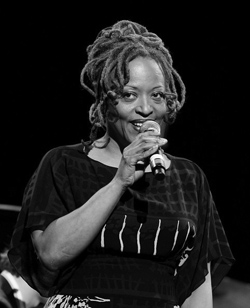 Cassandra Wilson became one of the top jazz singers of the ’90s, a vocalist blessed with a distinctive and flexible voice who is not afraid to take chances. Cassandra Wilson became one of the top jazz singers of the ’90s, a vocalist blessed with a distinctive and flexible voice who is not afraid to take chances.
Born Dec 4, 1955 in Jackson, MS, she began playing piano and guitar when she was nine and was working as a vocalist by the mid-’70s, singing a wide variety of material. Following a year in New Orleans, Wilson moved to New York in 1982 and began working with Dave Holland and Abbey Lincoln. After meeting Steve Coleman, she became the main vocalist with the M-Base Collective. Although there was really no room for a singer in the overcrowded free funk ensembles, Wilson did as good a job of fitting in as was possible. She worked with New Air and recorded her first album as a leader in 1985. By her third record, a standards date, she was sounding quite a bit like Betty Carter.
Cassandra Wilson changed directions and performed an acoustic blues-oriented program for Blue Note called Blue Light ‘Til Dawn. By going back in time, she had found music that suited her voice and style, and Wilson has continued interpreting in fresh and creative ways vintage country blues and folk music up until the present day.
During 1997 she toured as part of Wynton Marsalis’ Blood on the Fields production. Traveling Miles, her tribute to Miles Davis, followed two years later. For 2002’s Belly of the Sun, she drew on an array of roots music — blues, country, soul, rock — to fashion a record that furthered her artistic career while still aligning well with trends in popular music.
Posted in Artist of the Month | 5 Comments »
Thursday, September 1st, 2011
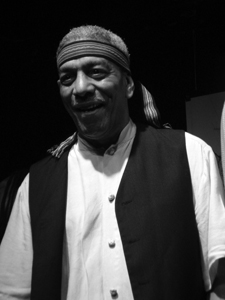 Born William Vincent Walker in Mobile, Alabama in 1947, his family moved to New York City’s Harlem while he was still an infant. In junior high school he was nicknamed Billy Bang after a cartoon character, and over his initial protests, it stuck. Around the same time, his primary interest turned to music, and he took up the violin, switching to percussion in the early ’60s when he became captivated by Afro-Cuban rhythms. While attending a Massachusetts prep school under full scholarship, he met and began playing with fellow-student, folk-singer Arlo Guthrie. Born William Vincent Walker in Mobile, Alabama in 1947, his family moved to New York City’s Harlem while he was still an infant. In junior high school he was nicknamed Billy Bang after a cartoon character, and over his initial protests, it stuck. Around the same time, his primary interest turned to music, and he took up the violin, switching to percussion in the early ’60s when he became captivated by Afro-Cuban rhythms. While attending a Massachusetts prep school under full scholarship, he met and began playing with fellow-student, folk-singer Arlo Guthrie.
Drafted into the army following graduation, Bang was sent to Vietnam, an experience that profoundly affected his life, often quite painfully. Returning home and radicalized, Billy became active in the anti-war movement, and by the late ’60s had returned to music.
Heavily inspired by the exploratory fire of John Coltrane, Eric Dolphy, Ornette Coleman and the liberating energy of the free-jazz movement, Bang returned to the violin as his principal means of expression. Attending New York’s Queens College, and studying privately with renowned violinist Leroy Jenkins, Bang became a key member of the dynamic New York avant-garde scene of the ’70s. Forming his own group, The Survival Ensemble, and working with artists like David Murray, Frank Lowe, William Parker and the legendary Sam Rivers, Billy began to reach an international audience in 1977 with the String Trio, remaining with the cooperative ensemble for nine years.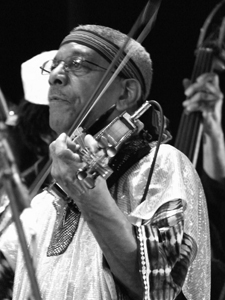
During these same years he continued to tour and record with his own ensembles, as well as genre-busting ensembles like The Decoding Society and Bill Laswell’s Material (alongside guitar giant Sonny Sharrock). He even briefly led his own funk-oriented band, Forbidden Planet, and in 1981 taught at the University of Nebraska.
He continued to work and collaborate with notables like Murray, Don Cherry and James ‘Blood ‘ Ulmer, and in 1982 began a ten-year association with the incomparable Sun Ra, concluding with a 1992 quartet recording for Soul Note, “A Tribute to Stuff Smith,” dedicated to the father of the jazz violin. In 1990, Bang formed the Solomonic Quartet with trumpeter Ahmed Abdullah, and continued to freelance and lead his own groups.
Relocating to Berlin in 1996 where he lived until 2000, Bang criss-crossed the Atlantic frequently, performing all over Europe and doing five tours through the South and Midwest with percussionist Abbey Rader, three of which included tenorman Frank Lowe. He also began a regular working relationship with percussionist Kahil El’Zabar in 1996, performing in duet, and sometimes as a trio with esteemed Art Ensemble of Chicago co-founder and bassist Malachi Favors Maghostut.
His CD (released in October 2001) titled “Vietnam: The Aftermath” evokes and confronts the memories of his Vietnam experiences and showcases the fine compositional skills that have always marked his own recordings.
Returning to New York in 2000, Bang continued his busy schedule, touring Europe in the Fall of 2001 with David Murray, continuing a musical interaction that has lasted over 25 years with a series of concerts and a collaborative dance work in Birmingham, England.
He also toured Europe in November 2001 and the U.S. in January 2002 in duet with El’Zabar.
A dazzling improviser, excellent composer, and provocative leader, Billy Bang remains on the cutting-edge of jazz expression.
Posted in Artist of the Month | 4 Comments »
Wednesday, August 31st, 2011
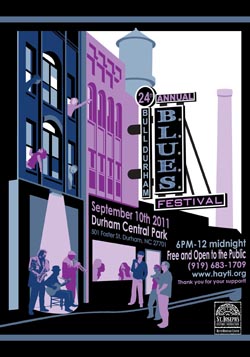 Saturday, September 10, 2011 Saturday, September 10, 2011
6pm-12 Midnight (gates open at 5pm)
Durham Central Park
501 Foster Street
Durham, NC
This event is free and open to the public. Our way of saying thank you to the community for 24 year of unwavering support.
Click here to view the lineup.
Posted in Public Affairs | 2 Comments »
Wednesday, August 31st, 2011
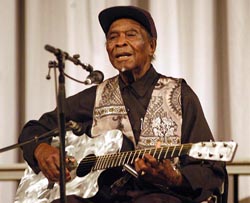 Tune into WNCU on Saturday, Sept.3 at 9 p.m. for a re-broadcast from WXPN’s Blues and Beyond featuring Honeyboy Edwards – A Long Life in the Blues. Tune into WNCU on Saturday, Sept.3 at 9 p.m. for a re-broadcast from WXPN’s Blues and Beyond featuring Honeyboy Edwards – A Long Life in the Blues.
At 92, David “Honeyboy” Edwards was still touring and playing the blues, though he no longer hopped freight trains to get around. His new album “Roamin’ And Ramblin'” covered an amazing period of sixty-five years, from his 1942 Library of Congress sessions with Alan Lomax to sessions he did last year with Bobby Rush, Billy Branch, and others. The album also offered some previously unavailable recordings from the 1970s, featuring Edwards with the late and great Big Walter Horton on harmonica, and also Sugar Blue. We’ll feature “Roamin’ And Ramblin'” on this program.
We’ll also hear from Robert Johnson — Honeyboy was with Johnson when he died — from a new, sound-quality-improved reissue of his work, and we’ll hear pianist Jimmy Blythe, both from piano roll and 78 rpm record. The show also includes music from Larry Willis and Catherine Russell, and African sounds from Leni Stern and Lionel Loueke.
Posted in Music News | 3 Comments »
Wednesday, August 31st, 2011
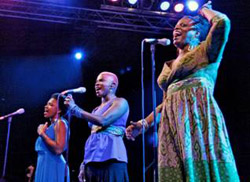 WNCU will air a special thank you concert for all supporters during our fall fund drive. Tune in on October 11at 7 p.m. WNCU will air a special thank you concert for all supporters during our fall fund drive. Tune in on October 11at 7 p.m.
Sing the Truth! is Dianne Reeves, Angelique Kidjo and Lizz Wright singing together and taking turns on music by Miriam Makeba, Nina Simone, Abbey Lincoln, Tracy Chapman and more. The voices are amazing, and so are the songs. “Powerful” barely describes the impact. See a short video at wbgo.org/Detroit.
Posted in Music News | 2 Comments »
|



 North Carolina Central University received final approval today from the University of North Carolina Board of Governors to introduce a doctor of philosophy (Ph.D.) program in integrated biosciences. The university will now begin recruiting students to enter the program in fall 2012, and would award its degrees four years later. They would be the first Ph.D.s awarded by the university in more than 50 years.
North Carolina Central University received final approval today from the University of North Carolina Board of Governors to introduce a doctor of philosophy (Ph.D.) program in integrated biosciences. The university will now begin recruiting students to enter the program in fall 2012, and would award its degrees four years later. They would be the first Ph.D.s awarded by the university in more than 50 years.
 Cassandra Wilson became one of the top jazz singers of the ’90s, a vocalist blessed with a distinctive and flexible voice who is not afraid to take chances.
Cassandra Wilson became one of the top jazz singers of the ’90s, a vocalist blessed with a distinctive and flexible voice who is not afraid to take chances. Born William Vincent Walker in Mobile, Alabama in 1947, his family moved to New York City’s Harlem while he was still an infant. In junior high school he was nicknamed Billy Bang after a cartoon character, and over his initial protests, it stuck. Around the same time, his primary interest turned to music, and he took up the violin, switching to percussion in the early ’60s when he became captivated by Afro-Cuban rhythms. While attending a Massachusetts prep school under full scholarship, he met and began playing with fellow-student, folk-singer Arlo Guthrie.
Born William Vincent Walker in Mobile, Alabama in 1947, his family moved to New York City’s Harlem while he was still an infant. In junior high school he was nicknamed Billy Bang after a cartoon character, and over his initial protests, it stuck. Around the same time, his primary interest turned to music, and he took up the violin, switching to percussion in the early ’60s when he became captivated by Afro-Cuban rhythms. While attending a Massachusetts prep school under full scholarship, he met and began playing with fellow-student, folk-singer Arlo Guthrie.
 Saturday, September 10, 2011
Saturday, September 10, 2011 Tune into WNCU on Saturday, Sept.3 at 9 p.m. for a re-broadcast from WXPN’s Blues and Beyond featuring Honeyboy Edwards – A Long Life in the Blues.
Tune into WNCU on Saturday, Sept.3 at 9 p.m. for a re-broadcast from WXPN’s Blues and Beyond featuring Honeyboy Edwards – A Long Life in the Blues. WNCU will air a special thank you concert for all supporters during our fall fund drive. Tune in on October 11at 7 p.m.
WNCU will air a special thank you concert for all supporters during our fall fund drive. Tune in on October 11at 7 p.m.